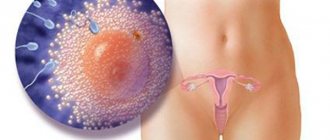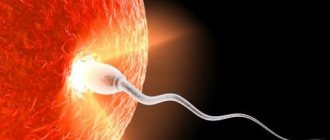Ovulation is the main sign of a woman's fertility. Fertility depends on the presence of a mature egg and its release into the fallopian tubes. This phenomenon occurs in all women at different times. The average value is considered to be 12–14 days from the beginning of the menstrual cycle. It is formed by the work of several hormones. These same substances are also necessary for the onset of ovulation. Under the influence of the hormonal system, a woman has signs of approaching favorable days for conception. These include nausea during ovulation.
Etiology of female fertility
Ovulation is considered the most favorable period for planning pregnancy. For many patients, it occurs in the middle of the menstrual cycle.
The release of the egg depends on the luteinizing substance. This hormone replaces estrogen and promotes rapid growth of the follicle. Under the influence of luteinizing hormone, the follicle walls crack. Through the resulting hole, the egg is released into the fallopian tubes.
The duration of the ovulatory period cannot exceed 5 days. The beginning of the stage is characterized by the appearance of PH. From this time on, the couple can begin planning. The end of ovulation occurs after the death of the egg. The female reproductive cell is not capable of living for more than a day. For this reason, after its release, conception is possible only within 24 hours.
The duration of the ovulatory phase depends more on the activity of sperm. Male reproductive cells can live in the female body for 3–4 days. This is what allows a woman to become pregnant before ovulation.
Some couples use this ability of sperm to plan the specific sex of the child. Numerous studies have shown that boy sperm can live no more than two days. Sperm with the female gene remain active for 4–5 days. If a couple wants to conceive a boy, sexual intercourse should occur on the day of ovulation. If a girl is planned, sex should occur 3–2 days before ovulation.
Methods for determining a favorable period
You can determine when ovulation is approaching in a variety of ways. The easiest way for many women is to use test cassettes. They are sold at any pharmacy and have different prices. The cassette is easy to use. The test end is dipped into the urine. There are two stripes on the study area. One strip is treated with a reagent that colors upon contact with ordinary liquid. The second line is capable of changing color only when interacting with luteinizing hormone.
A woman's urine on any day of the menstrual cycle contains luteinizing hormone. Its increase is observed 5 days before the fertile period approaches. From this time on, the woman should monitor the intensity of the coloring of the test area. The day before ovulation the stripe becomes bright. At the peak of luteinizing substance activity, the test strip is brighter in color than the control zone. The day after it grows, ovulation should occur. But tests do not always allow a woman to determine a favorable day.
To accurately determine the beginning of the ovulatory period, it is necessary to attend an ultrasound diagnosis. Diagnosis of follicle growth and egg release is called folliculometry. The procedure is carried out in a medical center. A visit to the gynecologist should begin on days 5–6 of the menstrual cycle. This will allow you to correctly determine the presence of a dominant follicle that will participate in ovulation.
Signs of a favorable phase
Not all women have the opportunity to buy tests or attend folliculometry. In this case, you need to pay attention to the signs of ovulation. The following signs of the ovulatory phase are considered:
- change in vaginal discharge;
- increased libido;
- breast tenderness;
- nausea and dizziness;
- pain in the lower abdomen.
The main sign that a favorable period is approaching is a change in vaginal discharge. In the first days, the woman has no discharge. Gradually, the cervical canal begins to expand. At this time, the patient experiences slight mucous discharge. Before ovulation, the canal opens more. The canal glands begin to work more actively. Two days before ovulation, an increase in the volume of cervical fluid is observed. The discharge begins to stretch and become transparent.
There is also an increase in libido. A woman's sexual activity increases due to the hormonal system. Hormones are controlled by a woman's pituitary gland. Under the influence of substances, other parts of the brain are also activated. Due to this, increased sexual desire is observed within 5 days. A decrease in hormonal levels causes a decrease in desire. This phenomenon is thought out by nature to increase the chances of pregnancy.
Breast tenderness is also due to changes in hormones. The luteinizing substance promotes a slight increase in prolactin. Prolactin is responsible for preparing the mammary glands for lactation. Against the background of its development, the glandular tissue of the breast expands. Extension increases the stretch of the muscle frame. Pain or pulling sensations appear. After the end of the favorable stage, prolactin decreases. The mammary glands stop hurting and take their usual shape.
Some patients experience pain from the failed ovary. The pain occurs due to the enlargement of the follicle and its rupture. Also, the symptom may appear due to improper location of the uterine cavity. When the uterus is strongly pressed against the anterior wall of the peritoneum, severe pain is observed during menstruation and ovulation.
Causes of dyspeptic disorder
Nausea should be considered separately. This symptom does not appear in all women. The following causes of nausea are considered:
- activity of luteinizing hormone;
- spasms of the uterine wall;
- early toxicosis;
- stomach upset;
- pressure of the ovary on the peritoneum.
In many cases, nausea occurs during ovulation due to the negative influence of hormonal levels. The fertile phase is characterized by a peak of luteinizing substance activity. This hormone affects the absorption of food in the stomach. For this reason, some women experience nausea.
Various pathologies of the gastrointestinal tract can aggravate symptoms. Nausea is observed if there is a history of ulcers or gastritis. Pancreatitis also negatively affects a woman’s condition during the ovulation period.
Nausea is also observed with strong contractile activity of the uterine cavity. The uterus also contracts due to the action of hormones. Contraction promotes faster movement of the egg after possible fertilization. Conception occurs in the fallopian tube. For pregnancy to develop correctly, the embryo must implant in the uterus. To do this, the smooth muscles of the uterus push the cell towards the cavity from the tubes. Strong contractions irritate the abdominal organs. The negative effect extends to the stomach. It is also being reduced. The woman feels nauseous.
Sometimes the cause is strong pressure of the ovary on the peritoneal wall. Under pressure, the spasm of the smooth muscles of the abdomen intensifies. Spasms irritate the walls of the stomach. The woman begins to feel sick.
Nausea may also occur due to early toxicosis. In many cases, the first weeks of pregnancy are not accompanied by obvious signs. The woman does not experience any sensations. But a sharp increase in human chorionic gonadotropin causes stomach upset. Often nausea with early toxicosis leads to vomiting. Vomiting also occurs when there is no food in the stomach. To determine the causes of nausea, a woman needs to undergo diagnostics.
Diagnostic measures
If nausea occurs only during ovulation, it is necessary to donate blood to check hormone levels. The doctor is interested in the qualitative indicators of luteinizing substance and prolactin. If the levels of these hormones are elevated, hormonal therapy may be necessary.
An ultrasound examination is also prescribed. An ultrasound helps the doctor examine the walls of the stomach, the shape of the bulb and the pancreas. If no visible changes are observed, it is necessary to undergo such an unpleasant procedure as fibrogastroscopy. At the end of the device there is a camera that gives a clear clinical picture.
If during examination no pathological changes are found in the patient, the reason lies in the physiological characteristics of the woman. To reduce nausea, the doctor prescribes medications.
Therapy depends on the reasons that caused nausea during ovulation. In many cases, treatment with metoclopramide is used. This medicine relieves spasms from the walls of the stomach. This helps eliminate the unpleasant symptom.
If nausea is accompanied by vomiting, other medications must be used. Adsorbents have a good effect. For this purpose, during ovulation you can take smecta, enterosgel and neosmectin. You can also use activated carbon. When taking it, you need to know your weight. A charcoal tablet acts on 10 kg of body weight.
Many women ask whether nausea can be a sign of approaching ovulation. Only a doctor can answer this question accurately after a thorough medical examination. Self-treatment is not recommended. The cause of nausea should be determined at a medical center.
Ovulation is the peak of the menstrual cycle when many hormonal changes and physiological processes occur. The female body behaves differently during the release of the egg. Among the most common symptoms diagnosed are: increased libido, the appearance of viscous discharge, breast tenderness, nausea, and pulling sensations in the lower abdomen. Basically, in healthy women, the ovulatory period passes without any unpleasant symptoms. Nausea and pain in the pelvic area are symptoms not only of a favorable phase of the cycle, but also of many gynecological diseases.
A woman’s well-being during ovulation depends on the individual characteristics of the body, state of health and nervous system. The following are the main causes of nausea and vomiting in the middle of the menstrual cycle:
- Pregnancy. If the period of conception does not exceed 3 weeks, then a situation occurs when the woman is not aware of her situation. Mild nausea during ovulation can occur every month, so many pregnant girls confuse the symptoms. The appearance of unpleasant lightheadedness, aversion to smells and previously loved food indicates the birth of a new life inside the body. Many women, during the phase of release of the corpus luteum, feel a pull in the lower abdomen, food preferences change, as well as mood. Pregnancy has the same symptoms. In the first month, such symptoms may indicate the following problems:
- insufficient levels of the hormone for the adaptation of the embryo, and in this case there is a threat of miscarriage;
- ectopic pregnancy - a condition that leads to death or infertility of a woman;
- death of the embryo.
If you experience severe pain in the lower abdomen and lower back, increased body temperature, or vomiting during the period of ovulation, you should urgently contact a gynecologist to find out the cause of the ailment.
- Features of the location of the uterus. Each organism is individual in its structure. The pelvic organs of all women have different sizes, shapes and locations. These factors determine the level of fertility. During the ovulatory phase, the uterus increases in size, which leads to irritation of the pelvic receptors. A change in the volume of the reproductive organ in the middle of the cycle may be due to an incorrect position inside the abdominal cavity:
- retroflexion – bending of the uterus towards the back;
- anteflexio - movement of the organ relative to the position of the neck; in this case it forms an obtuse angle;
- anteversio - bending of the body of the uterus anteriorly (towards the center).
Such positions depend on the fullness of the bladder and intestines, the location of adjacent pelvic organs, as well as the presence of polyps, cysts or other neoplasms. Surgical interventions, abortions, curettage and surgical childbirth can change the structure of the uterus, as well as deform it.
- Violation of water-salt balance. The maximum increase in progesterone during ovulation makes changes in women’s eating habits. Many people begin to lean on salty or sweet foods, and some experience a lack of appetite. Due to such deviations in the diet, changes occur in the lytic activity of the blood, an imbalance of water balance occurs, which, in turn, provokes attacks of nausea. It is important to follow the norm and drink at least two liters of water a day, especially in the middle of the menstrual cycle.
- Gynecological diseases. Attacks of nausea and vomiting at the onset of ovulation and several days after it signal the presence of problems with women's health. This is basically how inflammatory processes or pathologies that arise due to hormonal imbalances manifest themselves:
- cystitis;
- endometriosis;
- cervical erosion;
- herpes;
- gonorrhea;
- candidiasis;
- trichomoniasis.
Genitourinary diseases such as sand in the kidneys, cystitis, pyelonephritis can manifest themselves not only during the period of growth of female hormones. In addition to nausea, pain occurs when going to the toilet, in some cases the temperature rises, the lower abdomen feels tight, and general malaise and weakness are observed.
- Insufficient growth of progesterone. Failure and slow increase in hormones during the ovulatory phase means it is impossible to maintain women's health and the frequency of the menstrual cycle. With a low level of progesterone, the release of the egg may not be observed, and the woman loses her chances of conceiving a child.
Hormonal imbalances provoke not only nausea, but also other symptoms:
- mood swings;
- migraine;
- intestinal disorders;
- lack of sleep;
- increased hunger;
- dizziness;
- weakness;
- loss of appetite;
- changes in food habits.
- Contractions of the uterus. To facilitate fertilization, the reproductive organ helps the egg exit its shell through contractile muscle movements. Uterine contractions lead to compression of blood vessels, which leads to oxygen starvation, resulting in unpleasant lightheadedness.
- Common causes of nausea during ovulation include:
- taking oral contraceptives that provoke this symptom;
- stressful conditions of a woman’s nervous system, depression, emotional outbursts that cause attacks of nausea in the middle of the cycle;
- against the background of instability of psychological states, blood pressure rises, headaches and vascular spasms appear;
- hormonal imbalances, because a deficiency of some hormones and an excess of others is a common cause of nausea in the middle of the menstrual cycle and in the second phase.
How to relieve symptoms
It is advisable to treat such a disease under the supervision of a doctor. But there are a few tips that can alleviate unpleasant symptoms:
- Try to balance your diet, enrich it with nuts, herbs, fruits, berries and vegetables.
- Use teas and infusions with ginger and mint as drinks.
- Avoid coffee, fried and fatty foods.
Peculiarities
In addition to medications that a doctor may prescribe, additional means to alleviate problematic ovulation may be:
- Relief of symptoms.
- Abstinence from smoking and alcohol.
- Massage and keeping your legs and lower body warm can help relieve the condition.
- Stay calm, avoid stress.
- Full sleep.
- Normalization of sugar levels - to increase it, you can eat rice, peas, pasta, corn, beans, but you don’t need to go overboard with sweets and chocolates.
- Eating vegetables and seafood is very useful during this period; it helps reduce discomfort in the lower abdomen and back.
- Don't overexert yourself, but don't forget about light physical activity.
- Avoid sexual intercourse.
- Avoid visiting bathhouses and saunas.
- In other cases, the doctor may prescribe antispasmodics and contraceptives to relieve persistent symptoms.
Nutrition correction
In order not to aggravate the situation, you should balance your diet during the period of ovulation. Enrich it with nuts, fresh vegetables and fruits, herbs, dried fruits.
You should refrain from fatty, fried, overly salty or sugary foods, and avoid smoked and spicy foods. Do not overeat so as not to overload your stomach, which is already sensitive during this period.
Lifestyle
To correct unpleasant sensations during the fertile period, one should not forget about normalizing lifestyle. It is important to get enough sleep, sleep at least 6 hours, ideally 8-9. If you smoke, try to reduce your cigarette consumption or quit smoking altogether. Do not drink alcohol. Walk in the fresh air, relax and don’t forget about light sports.
Medicines
If attacks of nausea do not subside, your doctor may prescribe antispasmodics to reduce discomfort. They can be “No-shpa”, “Spazmalgon”, “Baralgin”. The doctor may also prescribe vitamins and minerals. But all these medications should be taken only after consultation with a specialist.
Traditional methods
In addition to medications and other ways to facilitate ovulation, folk recipes may also be useful:
- The boron uterus can reduce pain, prevent inflammation, and reduce the manifestations of hormonal imbalance.
- Sage is good for its ability to normalize hormonal levels. It can be brewed or taken in tablet form.
- Rosehip and its decoction reduce the possibility of infection.
In what cases should you consult a doctor?
Mild nausea during the ovulatory period is a reasonable sign of the body’s preparation for conception, changes in hormonal levels, and restructuring of the reproductive system. The following reasons are identified for a woman to contact a specialist:
- General malaise that continues after the release of the egg.
- Severe dizziness.
- The appearance of bleeding.
- High body temperature.
- Migraine.
- Cutting pain in the lower abdomen and lower back.
- The occurrence of unpleasant sensations during urination.
- Nausea worsening at night and in the morning, turning into vomiting.
What additional symptoms should you see a doctor for?
- Nausea during ovulation lasts 2 or more days.
- During ovulation, you feel nauseous, have a migraine and feel dizzy.
- Heat.
- Vomiting and loose stools.
- Urination hurts.
- Fainting.
All of the above is a signal of the need for professional medical assistance. Notes taken over several days will help the doctor make a correct diagnosis. A specialist gynecologist will examine the symptoms in detail and prescribe appropriate treatment.
Features of therapy
Nutrition correction
If poor health and nausea are caused by natural changes in hormonal levels during the ovulatory phase, the first thing you can do is try to adjust your diet during this period of the cycle:
- exclude fried and smoked foods, too salty foods, caffeine, alcohol;
- adhere to a diet balanced according to KBJU;
- add more green vegetables and nuts to your daily diet;
- slight lightheadedness can be relieved with mint tea and ginger;
- maintain water balance by drinking at least 1.5 liters of liquid per day.
Lifestyle
During the period of ovulation, it is better for a woman to give up smoking, follow a work and rest schedule, have good sleep in a ventilated room, and try to avoid emotional breakdowns and stress. You can practice a light abdominal massage.
Medicines
Medicines should only be taken under medical supervision. Depending on the identified problem, the following medications may be prescribed:
- Antispasmodic drugs based on drotaverine. Baralgin and Spazmalgon relieve pain caused by cramps, but can significantly lower blood pressure, so people with hypotension should take them with caution. Medicines are strictly contraindicated for women during pregnancy and breastfeeding.
- Hormonal medications are prescribed based on an individual blood test to balance hormonal levels.
- Vitamins are prescribed for a lack of microelements.
Unconventional methods of treatment
For the treatment of such pathology, traditional medicine has many recipes, the main components of which are:
- Borovaya uterus.
- Fennel.
- Rose hip.
These herbs must be brewed and taken according to the instructions. It is important to remember that many infusions have a very strong effect on the body and hormonal levels, so they can only be taken after consulting a doctor.
Indications for going to the doctor
You need to go to the hospital in the following cases:
- when nausea lasts more than seven days;
- a gag reflex appears;
- lack of appetite;
- general weakness;
- bleeding outside of menstruation;
- increase in body temperature.
Since the symptoms are different, treatment methods must also be individualized. They are aimed at eliminating the causes.
In particular, you need to pay attention to nutrition. On such days, salty, fatty, fried foods and sweets should be excluded from the diet. However, nausea does not mean you need to go on a no-carb diet.
Doctors advise replacing sweets with dried fruits and dark chocolate. You should not overeat, because a large amount of food contributes to the deterioration of your health.
We must not forget about lifestyle. This includes healthy sleep, which should last at least eight hours a day. You should also give up bad habits.
Traditional methods of treatment are often used. They are aimed at normalizing all hormones in the body and at active functioning of the digestive system. One of the recipes is brewing hogweed matka. However, this must be done with the permission of a doctor. Fennel fruits and rosehip decoction help improve health.
Nausea during ovulation and other symptoms
Nausea during ovulation
These days, a woman’s body undergoes a change in hormonal levels, which, on the one hand, leads to the most joyful event in life, and on the other, is accompanied by minor and sometimes very severe disturbances:
- dizziness and general weakness.
- discomfort in the area where the ovaries are located.
- spasms in the uterus.
- lower back pain.
- vomit.
- change in taste sensations.
- rapid mood swings and aggression.
All of the above is not necessary, and these symptoms can only manifest themselves in the case of additional disorders. But nausea, barely noticeable in some, severe in others, is almost always guaranteed.
Possible symptoms of ovulation
Often women, when they feel sick during ovulation, mistake this condition for a symptom of a disease.
Additional signs of ovulation, in addition to nausea, may include other unpleasant sensations:
- discomfort in the lower abdomen and pain in the ovaries;
- aching and shooting pain in the lumbar region;
- general weakness, headaches and dizziness - during ovulation can also be observed in women who do not feel sick during this period;
- loss of appetite due to hormonal imbalance: it can worsen or, conversely, improve, often there is a desire to eat something unusual;
- lack of mood, its sudden changes, attacks of anger, irritation and aggression;
- copious mucous transparent discharge;
- swelling of the mammary glands, their heaviness and soreness.
In addition to these manifestations, a woman’s sexual activity increases for several days before and during ovulation. This is how nature intended it to increase the likelihood of conception.
Causes of nausea during ovulation
If during ovulation nausea is mild and is not accompanied by vomiting, pain, cramps and other troubles, this means that the body is in working mode and if you are confident that the cause is only in the menstrual cycle, you can stop it with medications.
However, there are many reasons why nausea is a sign of much more serious problems, which are not always dangerous, but require clarification.
- pregnancy. If such a suspicion arises, then it is necessary to consult a gynecologist, as this may indicate certain pathologies, such as ectopic pregnancy, fetal freezing and the threat of miscarriage at an early stage. Usually, under these circumstances, nausea alone cannot be avoided, and it is accompanied by pain in the lower abdomen and back, fever and deterioration in general well-being. Self-treatment in this case is absolutely unacceptable, as it can negatively affect the development of the fetus.
- pathological and other changes in the uterus. It can be congenital or obtained as a result of operations to remove cysts and tumors, after cesarean section and after abortion.
- gynecological diseases. Genital herpes, cystitis, erosion, trichomoniasis and other diseases can also often cause nausea.
- contractions of the uterus. They are very minor and help the egg prepare for fertilization.
- hormonal imbalances. In this case, nausea is accompanied by headaches, severe dizziness up to loss of consciousness, disturbances in appetite and bowel movements, and insomnia.
- water balance disturbance. It is accompanied not only by nausea, but also by a change in taste or lack of appetite.
- other reasons. These include hormonal imbalance, stress, anxiety, increased physical activity during ovulation, and taking hormonal contraceptives.
Causes
If in the middle of the cycle nausea practically does not appear, there is no vomiting, cramps or other unpleasant sensations, then the body is working normally. At the same time, there are many other reasons why a woman feels bad. This is about:
- pregnancy. When such suspicions exist, it is better to dispel them by doing a test or consulting a doctor. A gynecologist can also diagnose other pathologies, in particular, fetal failure, ectopic pregnancy, and threatened miscarriage. Under such circumstances, not only nausea is observed, but also the temperature rises, as well as the pain threshold in the abdominal area;
- diseases (herpes, cystitis, erosion);
- infections acquired during operations;
- hormonal imbalance. Then severe dizziness is added;
- contraction of the uterus. They are minor but noticeable;
- water balance disturbance;
- stress;
- increased physical activity.
By the way, nausea before ovulation may indicate pregnancy, which occurred in the last menstrual cycle. As a rule, two weeks pass after conception, so you can do a test to determine the level of hCG. Nausea after ovulation is also explained by successful conception. The exact cause will be determined by the attending physician, because it can be very different.
In what cases is it necessary to consult a doctor?
In what cases is it necessary to consult a doctor?
It should be repeated that in cases where nausea is easily tolerated and appears on certain days of the cycle, this is normal and should not be a cause for concern.
You should contact the clinic in cases when:
- severe and sharp pain or cramps appear in the lower abdomen.
- frequent and painful urination.
- nausea does not go away within a week and is periodically accompanied by vomiting.
- the elevated temperature does not subside for more than 3 days.
- blood in vaginal discharge.
- fatigue and general loss of strength.
If you have such symptoms, you should consult a doctor not even on the day of ovulation, but at any time, since they can be the cause of very serious diseases, sometimes not related to gynecology.
Can there be nausea during or after the release of an egg?
Important! During the monthly cycle, a woman's body is controlled by hormones, and this is the problem with the feeling of nausea during ovulation.
The final result of the menstrual cycle is ovulation. At the moment of ovulation, an egg ready for fertilization is released from the ovary. In a healthy body of a representative of the fair sex, this process is almost painless.
But if there are any malfunctions in the system, then the urge to vomit and discomfort arise. There are many reasons when you start to feel sick. The problem may lie in physiology or in the occurrence of some kind of disease. So can you feel nauseous during ovulation and is this normal? The appearance of nausea only on certain days of the cycle is considered normal if it does not cause noticeable discomfort.
If all clinical studies have been carried out and no pathology has been identified, then physiology is to blame.
In this case, specialists prescribe medications and prescribe a diet:
- prescribe more fruits, vegetables, herbs, nuts;
- massage and warming of the lower abdomen is indicated;
- tea is desirable - mint + ginger;
- caffeine and fatty foods are prohibited;
- Nicotine and alcohol are prohibited;
- stay calm and get enough sleep;
- tune in to positive emotions;
- If your blood sugar is low, increase it with carbohydrate-containing foods.
It has been proven that by regularly including fish and seafood in your diet, soft muscles relax, uterine pressure is eliminated and the feeling of nausea goes away.
Treatment of nausea during ovulation
Prevention. You should always start with this. This is not difficult at all and will also lead to overall improvement in health. Good sleep, proper nutrition, sufficient exercise, and reduced stress levels are always beneficial. As ovulation approaches, it is also worth streamlining your sex life, visiting public places less and shortening your time in the bathhouse, sauna and swimming pool.
Lifestyle. General behavior flows smoothly from the first point into the second. Fresh air, communication with family, loved ones and friends, which sometimes heals in itself. Give up all bad habits. Nothing could be more useful than this.
Medicines. When nausea during ovulation is caused by gynecological reasons, it is appropriate to take antispasmodics (no-shpa, spasgan, baralgin). Some hormonal medications in case an imbalance is detected and, of course, vitamin complexes. All this should be taken only after consultation with your doctor.
Folk remedies. Upland uterus, rosehip decoction, fennel fruits. All this affects hormonal levels and improves the functioning of the digestive system.
Getting pregnant on the day that most corresponds to this important process means ensuring the correct development of the unborn child, and nothing can be more important than this. From all of the above, the conclusion suggests itself that nausea during ovulation is an almost indispensable assistant in determining this unique day. But on the other hand, you shouldn’t treat this with excessive optimism either. Be that as it may, there is no need to be scared or panic. You need to listen carefully to your own feelings and if they give you fear, calmly get ready and go to the clinic, where the doctor will conduct all the necessary studies, take tests and prescribe the necessary treatment, if you cannot do without it.
Nausea during ovulation is perceived by many women as an alarming symptom. The appearance of discomfort has a connection with many different reasons. Women often associate poor health with the ovulatory period, but can nausea be considered a sign of ovulation or is it a pathological sign indicating the presence of health problems?
Treatment methods
Treatment is aimed at eliminating unpleasant symptoms and consists of an integrated approach.
Medicines
For pain and abdominal cramps, antispasmodics are used. Effective and popular are Baralgin, No-shpa, which is prohibited for pregnant women. To eliminate weakness, you can take vitamin complexes. In case of hormonal imbalance, hormones are prescribed. Only a doctor can prescribe them on an individual basis.
Traditional methods
The use of alternative medicine is possible only if the woman is sure that the real cause of nausea and malaise is ovulation.
A decoction of calendula, hogweed, sage, nettle and sorrel will help reduce pain. The listed herbs have contraindications in the presence of an inflammatory process in a woman or infection. In this case, the medicinal properties of the herbs will be harmful to the body, causing an exacerbation.
You should not warm up their abdomen - this will increase the pain. Massage with aromatherapy can be an excellent remedy against poor health.
Lifestyle
Good health requires certain sacrifices, which include giving up bad habits, taking a daily walk in the fresh air, sticking to a daily routine: going to bed and getting up at the same time, and eating food according to a schedule. The daily routine will ensure normal functioning of the body, good mood, and absence of ailments.
For some time, women should exclude too fatty and salty foods from their diet, and limit themselves to flour and sweets. We are not talking about a complete restriction; it is worth replacing the usual products with more useful ones, as healthy as possible. Replace cakes with yoghurt with dried fruits, dark dark chocolate and nuts. Monitor the feeling of fullness, do not convey it in order to avoid nausea.
Why can you feel sick during ovulation?
If you feel sick during ovulation, there are several reasons for this. A similar symptom occurs:
- If the water balance is disturbed.
- During pregnancy.
- For some diseases of gynecological and other nature.
- For hormonal imbalance.
- When the uterus contracts.
A woman may feel sick before or after ovulation due to a lack of water in the body. Violation of water-salt metabolism leads to the appearance of unpleasant symptoms. Normalizing the drinking regime will help correct the situation in this situation.
If there are no problems with the kidneys, then you should drink 1.5–2 liters of water per day. The water should be clean, enriched with minerals and beneficial elements. So that the body receives the necessary salts and substances.
If nausea and discomfort appear a week after ovulation, the woman perceives this as the first signs of pregnancy. But it’s too early to talk about conception. The urge to feel sick occurs due to hormonal changes in the body.
During pregnancy, other unpleasant symptoms may appear:
- breast sensitivity (the mammary glands and nipples themselves);
- dizziness, general weakness;
- drowsiness, irritability;
- frequent mood swings, tearfulness.
The reasons for the appearance of such signs are associated with hormonal changes in the body. Increasing levels of prolactin and progesterone have a certain effect on the body, as a result of which the above-described symptoms appear.
Nausea often indicates not pregnancy, but the presence of certain gynecological diseases.
When nausea occurs before and after ovulation, it may indicate the presence of the following diseases:
- Endometriosis (when the cells of the uterine mucosa actively grow, problems with conception and menstrual irregularities occur).
- Erosive changes in the cervical canal.
- Trichomoniasis (a sexually transmitted disease classified as venereal).
- Candidiasis (thrush, the cause of which is believed to be a fungus).
Discomfort of this kind also appears with inflammation of the bladder (cystitis). But, in addition to this symptom, a woman also experiences other signs of the inflammatory process:
- pain when urinating;
- blood in urine;
- purulent or mucous discharge from the urethra.
Nausea after ovulation or when the egg is released from the follicle is considered a sign of uterine spasm.
The spasm occurs at the moment when the uterus pushes the egg into the fallopian tube, where the process of fertilization most often occurs.
The spasm leads to a lack of oxygen, for this reason nausea occurs, it is accompanied by dizziness, vomiting and general weakness.
Dizziness and other symptoms go away as the body recovers and compensates for oxygen deprivation.
Before ovulation, the level of hormones in the blood is high, an increase in the concentration of progesterone allows the egg to mature. When the process is completed, hormone levels decrease.
As the concentration of progesterone and other hormones decreases, discomfort appears. It is temporary.
Other causes of vomiting and nausea
- A sharp drop or increase in blood pressure (occurs against the background of hormonal disruptions).
- Poor nutrition (refusal of certain foods or strict diet).
- Taking hormonal medications (synthetic hormones affect the body’s condition and lead to side effects).
- Diseases of the digestive tract.
- Disturbances in the functioning of the nervous system.
Unpleasant sensations can also occur if you have health problems. But in this case, they are permanent and do not occur during the period of ovulation.
Nausea before and after ovulation
If nausea before ovulation occurs on a regular basis, this may be a sign of:
- hormonal imbalance in the body;
- diseases of gynecological or other nature.
If, against the background of general discomfort, you feel dizzy, feel the urge to vomit, or have other unpleasant symptoms, then you should consult a doctor and donate blood for hormones.
If discomfort occurs on the 15th day after ovulation, then you should:
- Take a pregnancy test.
- Measure your basal temperature.
- Measure body temperature.
In certain cases, nausea occurs after ovulation and it indicates pregnancy. But in some cases, sensations may have a connection:
- with the threat of miscarriage;
- placental abruption;
- with an ectopic pregnancy.
In this case, the woman needs the help of a doctor, and contacting a doctor will help save the child or avoid serious complications (rupture of the fallopian tube, bleeding).
But it is worth noting that discomfort does not have any effect on the process of egg maturation itself. Sensations indicate that changes are occurring in the body. But they cannot influence the process.










